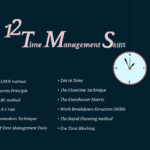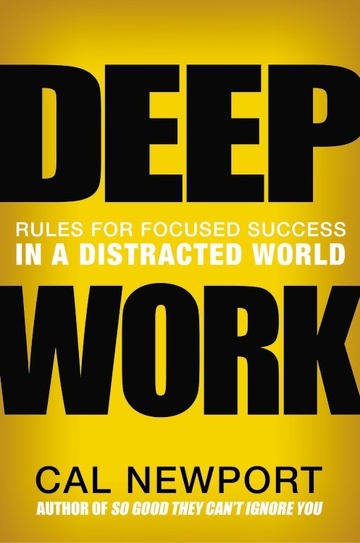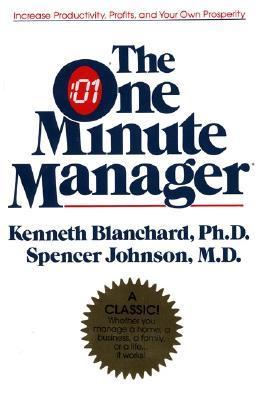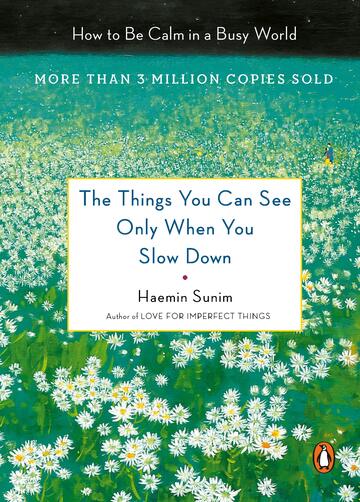Deep Work: Rules for Focused Success in a Distracted World by Cal Newport
Genre: Self Help | Productivity
Length: 296 pages
Publish Date: First published January 5, 2016
Have you ever found yourself at the end of your workweek with remainings on your bucket list? Despite working nonstop, very few of your larger, more difficult jobs were completed. What was the issue indeed?
Even with endless hours you put in, you were unable to reach deliberate peak productivity due to the lack of your focus or concentration for an extended period of time without interruption to push your cognitive powers to their limit which is referred to as deep work by Cal Newport in his book “Deep Work.”
Deep Work is a self-help book by Cal Newport where the author emphasises the rules for focused work to succeed in a distracted world.
What is deep work
Deep work can be referred to as a professional endeavour that is completed in a state of uninterrupted concentration that strains your cognitive faculties to the breaking point. These endeavours add fresh value, create new values and enhance your proficiency.
Five days a week, a couple of hours a day of intense attention may terminate in considerable productivity. While this trait is becoming increasingly valued and constrained, those who develop it and incorporate it into every aspect of their existence thrive.
We often work in open office spaces with plenty of distractions surrounding us, which prevents us from moving deeply into our job, that is why this type of work is called Shallow Work. It’s easy to replicate, doesn’t add any aspect new to the environment, isn’t cognitively difficult to deal with and is frequently done while preoccupied.
However, you must maintain complete concentration without interruption if you want to learn challenging topics rapidly. When you attempt to master a sophisticated new skill while not paying much attention, Attention Residue occurs.
Attention residue
Attention residue is the expression for the phenomenon that occurs when you attempt to acquire a complicated new skill, like programming, while not paying much attention, for example, when you browse Facebook and fire up too many circuits at once and your brain can’t operate properly.
To succeed in the modern economy, one has to possess two essential skills:
- the capacity to pick up challenging skills fast.
- the capacity to generate at an elite level of quality and speed.
When working on a deep work project, sudden distractions can lower cognitive capacity and to produce at peak levels, focus on a single task without distractions. For example, while composing an essay, you notice a few emails in your inbox that require attention. Considering your attention has been distracted by the little diversion you’ll be producing at a considerably slower pace of cognitive ability even if you go back to your serious task at this point.
Your focus does not automatically follow when you go from activity A to job B. Your attention is still ripped for an extended period even if you conclude job A before switching on to another task. Therefore, you must concentrate for lengthy periods of time, completely focused, and distraction-free on a single job in order to perform at your best.
Few Strategies to follow to implement Deep Work
1. Make it a Habit
Any intense work period should begin by forming an ongoing component of your daily schedule and making it a habit. The goal of incorporating rituals and routines into your workday is to reduce the amount of your constrained willpower required to shift into a continuous state of focus. You’ll need a lot of your limited willpower to focus your attention if you decide in the middle of a chaotic day to spend browsing the web instead of doing cognitively challenging things. It would take considerably less resolve to begin and continue if you implemented considerate routines and rituals, such as designating a certain time and quiet place for your deep activities every day.
2. Allow yourself to be Lazy
Deep work is performed more effectively while your brain is regularly stretched. So, put in a lot of effort at your work. However, when you’re through it, eventually end it. Establishing an uninterrupted routine is a crucial commitment for success. Your brain needs confidence to shift into a lower gear so it can start recharging for the following day. This confidence can only come from knowing that your task is done for the day. To put it another way, if you had respected a shutdown, you could end up getting less done since striving to fit a little extra work into the late hours could lead to less productive the next day.
3. Schedule internet time
Schedule a time slot for internet use in advance, and stay off of it entirely during other periods. Once you are permitted to use the internet again, make a note of it in a notebook. There is no acceptance to connect to any networks until that point, no matter how appealing that may seem. Essentially, the awareness that these devices cause us to lose focus and split up our time is growing. When your schedule becomes more flexible after work and the internet takes centre stage in your free time, this might be very risky. This sort of behaviour is risky since it impairs the ability of your mind to remain distracted-resistant in general, which makes serious work later on when you really need to focus harder. Put another way, when it comes to calming down, plan ahead and consider what you want to accomplish with your spare time rather than just grabbing whatever happens to attract your eye.











